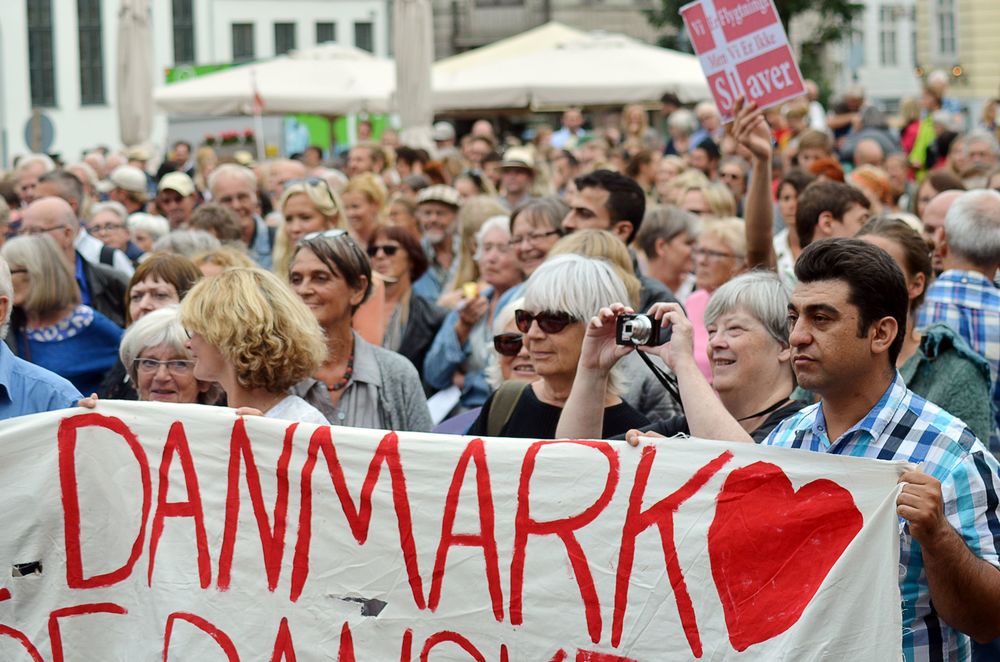
Karen Alves Andersson & Laura Rana Rossi
Denmark and its anti-immigration policy, that seeks “to be a country without parallel societies and without ghettos by 2030”, has been criticized by human rights organizations and by the UN itself for its harsh policies on refugees and xenophobia when dealing with immigrants in the country., mainly with Muslims.
Although Denmark is known as a country that offers its people basic principles of a well-developed and progressive society – how low social inequality, safety, quality education and health, these are speeches coming from the government itself that say they are determined to reach the “zero refugees” mark and will be a population “limited to westerners”. These are talks of a national plan, officially announced on 2020, which aims to extinguish low-income neighborhoods, where mainly Muslim refugees and immigrants live. According to Özlem Cekic, former Kurdish Member of the European Parliament and one of the first Muslim women to enter the Danish Parliament, this bill is "counterproductive", since the immigrants and Muslims residing in the neighborhood are also part of the working class.
As an example that Danish immigration policies have become more and more stringent over the years, in 2020, only 600 people received asylum in the country. Therefore, this data shows that immigration policies and “non-Western” discourse have increased, since in 2015 during the refugee crisis in Europe, more of 10.000 people were welcomed in the country. Between the years of 2015 e 2016, near 2,5 millions of refugees, mainly from Syria and African countries, crossed borders and applied for asylum to the EU. Turkey and Pakistan also received most of the Syrian refugees, but the European bloc ends up being more approached and prioritized by the global media.
currently, there are more than 1.200 Syrian immigrants at risk of deportation by Danish authorities. However, these claim that Syria no longer poses risks to its citizens, contrary to what the European Union claims, which reiterates the importance of stopping sending people back to countries in conflict. This friction of interests between Denmark and the EU could worsen, if the aforementioned policy with the objective of reaching "zero refugees" is maintained. Josep Borrell, head of foreign policy of the European Union (Mr PESC), stated that “deported Syrians may face forced recruitment, indiscriminate detention, disappearances, torture, physical and sexual violence", which can be interpreted as a speech directed at the Scandinavian country.
Like this, as we consider the growing xenophobic movement in Denmark, since 2015 and the restrictive immigration policies implemented by it., there is a clear disparity in behavior and positions in relation to its neighboring countries, Germany and Sweden, who receive about ten times more refugees than the Danes. Therefore, if these policies aimed at a more individualistic and divergent performance in the European scenario are maintained by Denmark, it can be argued that conflicts between the country and the European Union are likely to happen. In order to have a clearer notion of the size (in population) of these countries: Denmark has about 5,4 millons of citizens, the Germany (which is the most populous country and has received the most refugees in Europe) have approximately 83 millions of people and Sweden has a little more than 10 millions of residents.
References
• “Denmark passes law allowing it to pay third countries to take refugees”. Or balloon, 2021. Available in: https://oglobo.globo.com/mundo/sob-criticas-dinamarca-aprova-lei-que-lhe-permite-pagar-terceiros-paises-para-ficarem-com-refugiados-25046179
• Punches, Amanda. "First World? How Denmark will dismantle immigrant communities” See, 2020. Available in https://veja.abril.com.br/mundo/primeiro-mundo-como-a-dinamarca-vai-desmantelar-comunidades-de-imigrantes/
• Thing, Olivier. "Danish far right cultivates deliberate xenophobia". S sheet. Paul. Available in: https://www1.folha.uol.com.br/fsp/mundo/ft0902200604.htm
• Nielsen, Nikolaj. “Denmark threatens Syria deportations amid EU concerns”. Had Observe. Available in: https://euobserver.com/migration/151528
• Murray, Adrienne. “Denmark asylum: The Syrian refugees no longer welcome to stay”. BBC. Available in: https://www.bbc.com/news/world-europe-57156835
• McKernan, Bethan; Swash, Rosie; Kelly, Annie. “Denmark could face legal action over attempts to return Syrian refugees”. The Guardian, 2021. Available in: https://www.theguardian.com/global-development/2021/jul/29/denmark-faces-legal-action-over-attempts-to-return-syrian-refugees
• Burnett, Stephanie. “Denmark Wants Fewer 'Non-Western' Residents In Poor Neighborhoods” | DW | 29.03.2021." German wave. Available in: www.dw.com/pt-br/dinamarca-quer-menos-moradores-não-ocidentais-em-bairros-pobres/a-57039616
